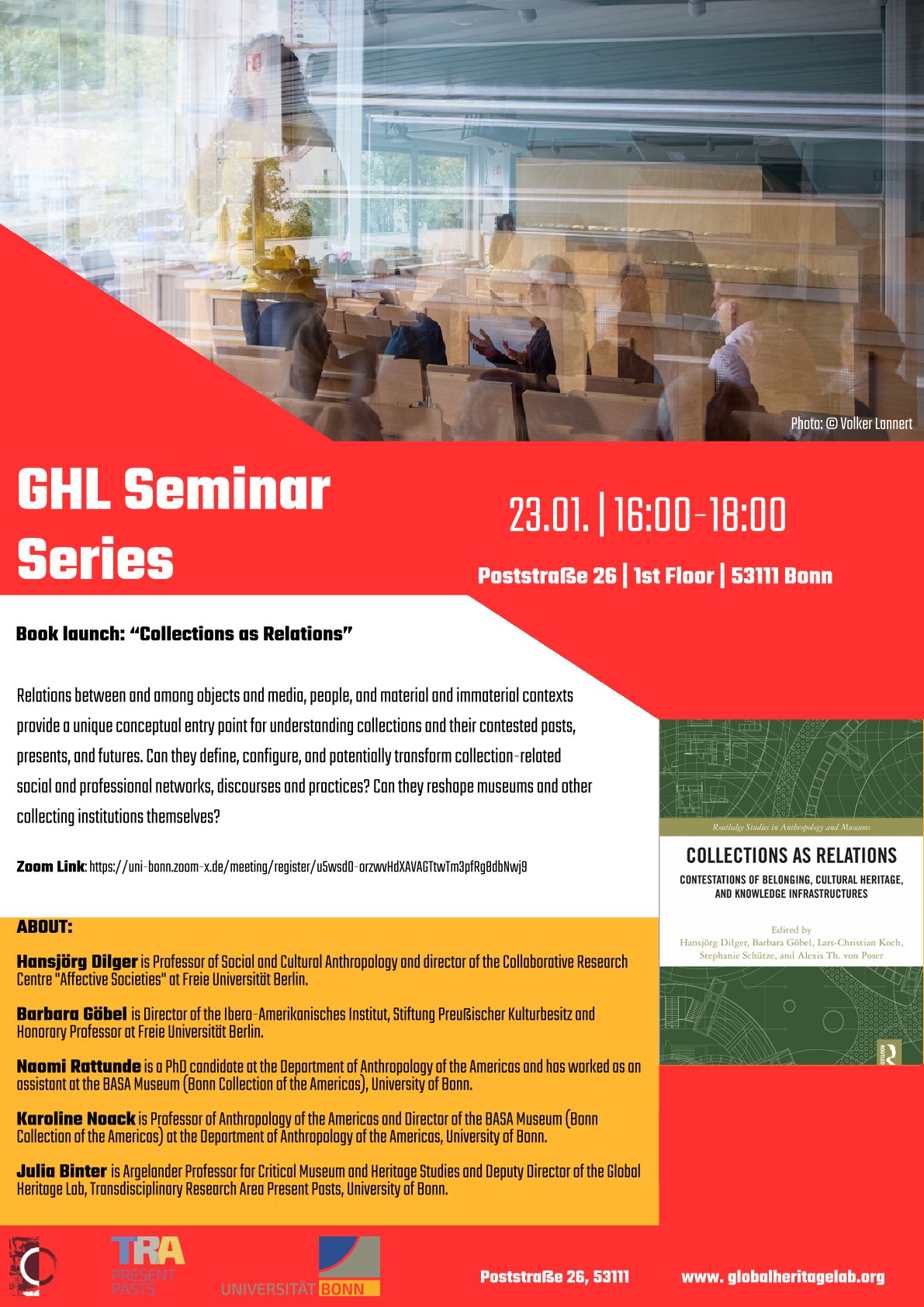
Collections as Relations: Contestations of Belonging, Cultural Heritage, and Knowledge Infrastructures
4 to 6 pm, 23.01.2025
GHL Seminar room at Poststraße 26, 1st Floor
Photo by Volker Lannert
The GHL seminar series continues on 23 January 2025 from 4 to 6 pm in our GHL Seminar room at Poststraße 26, 1st Floor. As a space for experimentation and dialogue, the series seeks to critically explore multiple pasts and presents to envision alternative futures. It aims to bring scholars and practitioners from across the globe together to engage, interact and address the current global multi-faceted crisis involving economic, ecological, social and cultural challenges and negotiations of heritage and museums as powerfully charged, conflictual, and creative spaces.
This seminar session brings five scholars to reflect on the recently published book Collections as Relations: Contestations of Belonging, Cultural Heritage, and Knowledge Infrastructures, edited by Hansjörg Dilger, Barbara Göbel, Lars-Christian Koch, Stephanie Schütze, Alexis von Poser.

About the discussants:
Hansjörg Dilger is Professor of Social and Cultural Anthropology and director of the Collaborative Research Centre “Affective Societies” at Freie Universität Berlin. His research focuses on decolonial, activist engagements with ethnographic collections as well as critical medical anthropology and the anthropology of religion.
Barbara Göbel is Director of the Ibero-Amerikanisches Institut, Stiftung Preußischer Kulturbesitz and Honorary Professor at Freie Universität Berlin. She is co-project leader of the BMBF funded Maria Sibylla Merian Centre Conviviality – Inequality in Latin America (Mecila). Her main research interests are knowledge asymmetries, collections, and digital transformation as well as socio-environmental conflicts in Latin America.
Naomi Rattunde is a PhD candidate at the Department of Anthropology of the Americas of the University of Bonn and has worked as an assistant of the BASA Museum (Bonn Collection of the Americas). Her research focuses on provenance research of ethnographic and archaeological collections from South America. She has conducted research in Bolivia and Ecuador.
Karoline Noack is Professor of Anthropology of the Americas and Director of the BASA Museum (Bonn Collection of the Americas) at the Department of Anthropology of the Americas, Bonn University. In addition to museums and collections, her research also focuses on social and cultural phenomena in the Andes in the longue durée, including the Inca and colonial periods.
Julia Binter is Argelander Professor for Critical Museum and Heritage Studies and Deputy Director of the Global Heritage Lab, Transdisciplinary Research Area Present Pasts, University of Bonn. She has conducted research on negotiations about the past, present and future in museums, theatre, film, visual arts, funerals, and fashion in Nigeria, Namibia, the UK, and Germany.
Book Abstract:
This book explores anthropological and global art collections as a catalyst, a medium, and an expression of relations. Relations—between and among objects and media, people, and material and immaterial contexts—define, configure, and potentially transform collection-related social and professional networks, discourses and practices, and increasingly museums and other collecting institutions themselves. The contributors argue that a focus on the—often contested—making and remaking of relations provides a unique conceptual entrypoint for understanding collections’—and ‘their’ objects’ and media’s—complex histories, contemporary webs of interactions, and potential futures. The chapters examine the local, translocal, and transregional relations of collections with regard to their affective, aesthetic, performative, and socio- moral qualities and situate them in the larger geopolitical constellations of precolonial, colonial, and postcolonial settings. Together they investigate ongoing shifts in the relations of collections and collecting institutions by identifying alternative approaches to conceive of, and deal with, anthropological and global art collections, objects, and media in the future. The book is of interest to scholars from anthropology, global art history, museum studies, and heritage studies
Join us at the Global Heritage Lab at P26 or online:
https://uni-bonn.zoom.us/meeting/register/u5wsdO-orzwvHdXAVAGTtwTm3pfRg8dbNwj9#/registration

